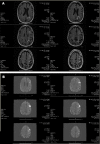Transient foreign accent syndrome
- PMID: 22674099
- PMCID: PMC3214216
- DOI: 10.1136/bcr.07.2011.4466
Transient foreign accent syndrome
Abstract
Foreign accent syndrome (FAS) is a poorly understood and studied syndrome as it is indeed a rare entity. Since its first description in 1907 by French neurologist Pierre Marie involving a patient who presented with an Alsatian accent, there are approximately only 60 cases reported in the literature. The majority of such cases of FAS have been secondary to cerebrovascular accidents. Of the cases in the literature, none report such a transitory nature of FAS. In this particular case, a 55-year-old male presented with a foreign accent. This FAS was triggered by ischemia and was reversed after a seizure, the first reported in the literature.
Conflict of interest statement
Figures
References
-
- Lippert-Gruener M, Weinert U, Greisbach T, et al. Foreign accent syndrome following traumatic brain injury. Brain Inj 2005;19:955–8 - PubMed
-
- Christoph DH, de Freitas GR, Dos Santos DP, et al. Different perceived foreign accents in one patient after prerolandic hematoma. Eur Neurol 2004;52:198–201 - PubMed
-
- Ryalls J, Whiteside J. An atypical case of Foreign Accent Syndrome. Clin Linguist Phon 2006;20:157–62 - PubMed
-
- Edwards RJ, Patel NK, Pople IK. Foreign accent following brain injury: syndrome or epiphenomenon? Eur Neurol 2005;53:87–91 - PubMed
-
- Abel TJ, Hebb AO, Silbergeld DL. Cortical stimulation mapping in a patient with foreign accent syndrome: case report. Clin Neurol Neurosurg 2009;111:97–101 - PubMed
Publication types
MeSH terms
LinkOut - more resources
Full Text Sources
Medical
Research Materials
Miscellaneous

